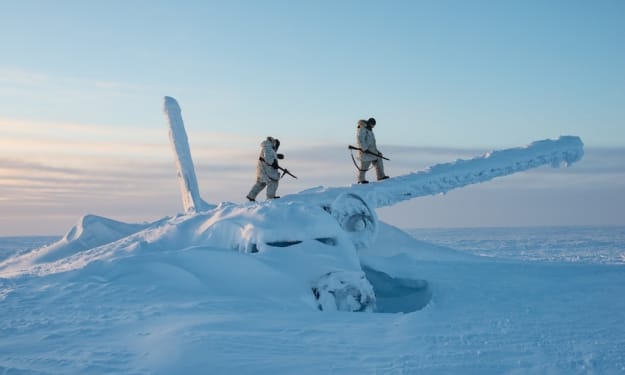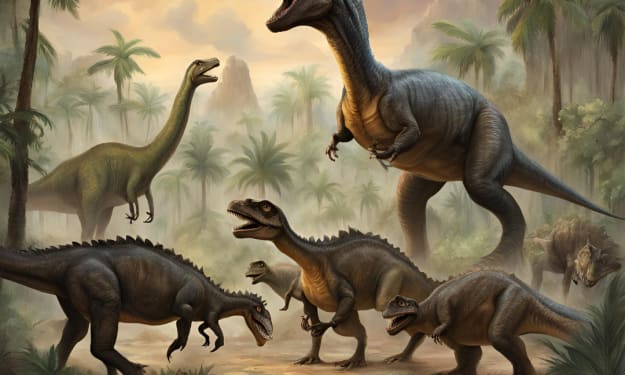
On King William Island, the rangers traveled west in a long line of snowmobiles. Some pulled wooden sleds, heavy with food, camping gear, and military equipment. I joined the procession on a borrowed machine, and after several frigid hours driving into the enormous night, we reached a frozen lake called Kakivakturvik.
In bright beams of headlamps and headlights, the rangers scattered over the lake and began setting up large canvas tents on the ice. Caribou skins and tarps were dragged in, then foam mattresses, sleeping bags, coolers filled with food.
Soon the tents glowed with lantern light and whispered with the sound of kerosene stoves. Steaming cups of tea were passed around, a few stories shared about favorite sled dogs, and then it was back outdoors. In small groups the rangers fanned out over the lake, chopped holes in the foot-thick ice, and dropped fishnets into the black water.
Across the Canadian Arctic, ranger patrols mix military exercises with traditional activities such as hunting and fishing that are still a necessary part of life in the far north. Over the next several days Marvin’s group tried to balance these with the martial stuff of navigation drills and training on GPS devices.
Strong winds hurtled off the frozen sea, and thick fog and clouds hung low over the tundra. The temperature rose toward freezing a couple of times, then fell again and stayed far below zero. All this was typical for late November, and soon our lives collapsed into the small white and gray world around camp.
Days began and ended at the fishnets. The haul of iqalupik, arctic char, was so plentiful that soon each tent was flanked by a small stand of stiff pink bodies, stuck tails first into deep drifts of snow. When we got hungry, we simply slipped an arm out the door and snagged a fish. Sometimes we cut it up and made soup. More often we ate it raw, slicing the char into our mouths. Frozen sushi, Marvin called it, fresh and cold, almost tasteless, with a note of steel from the knife blade.
Beyond the nets, our hours vanished into a well of small tasks. In the day’s few hours of weak sunlight, there were stoves to tend, ice to melt for drinking water, tents to relocate when the ice below them turned to slush. Snowmobiles regularly broke down in the unforgiving cold. At one point, a mother polar bear appeared near camp with two cubs, which made the act of heading off alone to relieve oneself—already dismal enough in the puckering cold—an even uglier prospect.
During the mission I shared a tent with Marvin Atqittuq and his father, Jacob, who at 74 was one of Gjoa Haven’s most celebrated hunters. Jacob Atqittuq had been born in an igloo and spoke only enough English to make occasional jokes. Over his lifetime he’d survived brutal winters and hungry bears, searing frostbite, boat accidents, even a season of famine that had killed many Inuit. Each morning he woke before us, and at the foot of the broad mattress we all shared, he cooked bannock, a sweet, doughy bread, and softly sang old church hymns in Inuktitut.
One evening, as we lay in our sleeping bags, Marvin told me he’d once tried to leave the Arctic. He’d found a vocational school in southern Canada that offered classes in small engine repair. But years before, Jacob had watched another son taken from home and forced to attend one of Canada’s notorious residential schools, where indigenous knowledge and traditions were cruelly repressed. He asked Marvin to stay. Learn the old ways. Keep the family whole.
Marvin didn’t regret his decision. He was a father himself and a volunteer fireman in Gjoa Haven. He’d found a job with a company maintaining telephone lines, and he was slowly learning all he could from Jacob. But Jacob also seemed to inhabit a simpler, older Arctic.
The one Marvin knew was complicated. There were fewer opportunities, more drugs. There were social media and the internet. Marvin understood his Arctic was becoming something new. He’d read that the ice was melting, that another war might come north. He knew the weather was different from what he’d known as a child—not necessarily warmer but more unpredictable.
As for the gold rush he kept hearing about, he couldn’t see it. “All these things are supposed to be happening,” he told me, referring to the predictions of new infrastructure and jobs to harvest the region’s hidden riches. “I don’t really feel much change. I definitely don’t feel like I’m part of it.”
The next morning I left camp to scout for caribou with the Atqittuqs and a few others. When a blizzard blew in and swallowed our hunting party, it was Jacob who led us back to camp, using a combination of GPS and some other, inner map. I drove my snowmobile slowly behind Marvin’s, nearly blinded by a skin of ice that formed inside my goggles. Soon the world became so intensely white that I could no longer tell where the earth ended and the storm began.
At some point, the balaclava covering my face slipped out of place, exposing an inch of skin. I felt a burning sensation, as though someone had pressed a hot coin to my cheek, but I was busy keeping up. Hours later, in our tent, Jacob saw the burn. He pressed his thumb to it. “Good,” he said.
About the Creator
Adams
writer | artist | chef
Enjoyed the story? Support the Creator.
Subscribe for free to receive all their stories in your feed. You could also pledge your support or give them a one-off tip, letting them know you appreciate their work.





Comments
There are no comments for this story
Be the first to respond and start the conversation.